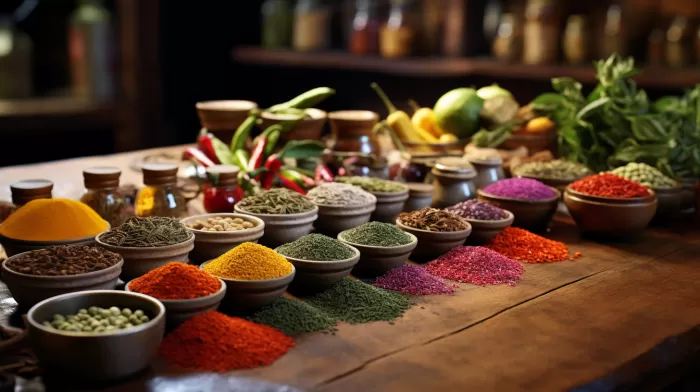Everyone knows how important food is to our overall health, but did you know that certain herbs and spices can improve your well-being through their powerful healing properties? Traditional Chinese medicine and Indian Ayurvedic medicine, two of the oldest medical systems in the world, lean heavily on herbal medicines for their remedies. Spices are a lesser-known source of healing power, but they are just as essential to these ancient systems.
In recent years, modern science has shown us that incorporating spices into our daily diet can have a significant long-term impact on our health, with minimal side effects. In this article, we’ll delve into some of the numerous benefits offered by various spices and how to use them for maximum health benefits.
Turmeric: Nature’s Golden Miracle
Turmeric, a relative of ginger, is a golden spice that not only adds flavor to your dishes but also packs a punch when it comes to health benefits. Turmeric has long been known for its anti-inflammatory properties, which can help alleviate conditions such as arthritis, muscle sprains, and more. This is due to one of turmeric’s active components, curcumin, which has been found to have numerous health benefits, such as supporting liver function, increasing brain-derived neurotrophic factors, and reducing the risk of heart disease. More recent research also suggests that curcumin has anti-cancer properties and can even help in the fight against Alzheimer’s disease (source).
The Power of Aromatherapy
The use of essential oils, or aromatherapy, is another ancient practice that has gained popularity in recent years due to its diverse healing properties. Extracted from flowers, plants, and herbs, these natural oils have scents that can provide soothing or invigorating effects depending on the specific plant. Aromatherapy can help alleviate symptoms of stress, anxiety, and depression, making it a valuable tool for mental health and wellness. Some popular essential oils include lavender, which has properties to reduce anxiety and improve sleep, peppermint, known for its energizing and headache-relieving effects, and eucalyptus, which is often used for its antibacterial and sinus-clearing properties (source).
Eat Right for Happy Joints
While there’s no magic cure for joint pain, specific dietary choices can have a significant effect on reducing pain and inflammation, allowing you to stay active and enjoy the activities you love most. Foods rich in omega-3 fatty acids, such as salmon, sardines, and mackerel, are recommended for their anti-inflammatory properties. Antioxidant-rich fruits and vegetables like cherries, blueberries, bell peppers, and spinach can also help alleviate joint pain. Herbs and spices like ginger, turmeric, and cinnamon not only add flavor to your dishes but also contain beneficial anti-inflammatory properties.
Put This Spice on Your Food to Kill Cancer
It may come as a surprise that the simple spice that’s sitting in your kitchen pantry might have cancer-fighting properties. One of these is capsaicin, a compound found in chili peppers that gives them their characteristic spicy kick. Capsaicin has been found to induce cell death in cancerous cells, thereby reducing tumor growth without harming healthy cells (source). Adding chili peppers to your cooking might just give you an extra layer of defense against cancer!
Ginger: The Multipurpose Healer
Ginger is another spice powerhouse that has gained popularity for its wide array of health benefits. This potent spice has long been recognized for its anti-inflammatory and antioxidant properties, as well as its ability to soothe digestive issues, alleviate pain, and fight various conditions such as heart disease, arthritis, and even cancer. Ginger can quickly be incorporated into your daily diet through teas, smoothies, or simply grated into your favorite dishes.
The Superspice With the Heat to Melt Fat and Open Arteries
Cayenne pepper, another chili pepper variety, is a spice known for its heat. It doesn’t just add flavor to your meals but also provides numerous health benefits. Cayenne peppers contain capsaicin, the same cancer-fighting compound found in other chili peppers. In addition, this potent spice can help you lose weight by boosting metabolism and suppressing appetite. Cayenne pepper has also been found to benefit heart health by reducing cholesterol and lowering blood pressure (source).
Fighting Alzheimer’s With a Kitchen Staple
While it’s been mentioned before in this article, it’s worth reiterating the power turmeric has in the fight against Alzheimer’s disease. Curcumin, the active component in turmeric, has been found to help remove amyloid-beta plaques in the brain. These plaques are one of the primary causes of Alzheimer’s disease. Incorporating turmeric into your daily routine might be a tasty way to keep your mind sharp and help ward off this debilitating disease.
In conclusion, it’s clear that various spices found in your average kitchen have notable health benefits when incorporated into your everyday meals. From reducing inflammation and joint pain to fighting cancer and Alzheimer’s, these potent ingredients offer a whole host of health solutions with minimal side effects. So go ahead and add some spice to your life – you’ll not only enhance the flavor of your dishes but also improve your overall health and well-being.



